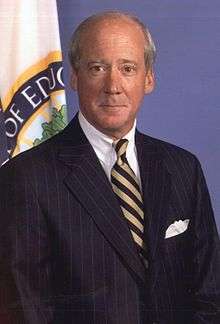Eugene W. Hickok
| Eugene W. Hickok | |
|---|---|
 | |
| United States Deputy Secretary of Education | |
|
In office June 5, 2003 – January 20, 2005 Acting: June 5, 2003 – April 19, 2004 | |
| President | George W. Bush |
| Preceded by | William D. Hansen |
| Succeeded by | Raymond Simon |
| 14th Pennsylvania Secretary of Education | |
|
In office March 20, 1995 – March 20, 2001 | |
| Governor | Tom Ridge |
| Preceded by | Jane Carroll (acting) |
| Succeeded by | Charles B. Zogby (acting) |
| Personal details | |
| Born |
Eugene Welch Hickok Denver, Colorado |
| Political party | Republican |
| Alma mater |
Hampden–Sydney College (B.A.) University of Virginia (M.A., Ph.D.) |
| Profession | academic, lawyer, lobbyist |
Dr. Eugene W. Hickok (Born 1951, Denver, Colorado) is an advocate for public education reform and an expert in constitutional law.
Education
Hickok is a 1972 graduate of Hampden–Sydney College in Virginia. He also received his master's and Ph.D. from the University of Virginia.
Career
Academics
For 15 years, Hickok taught political science at Dickinson College in Carlisle, Pennsylvania, and served as director of the college's Clarke Center for the Interdisciplinary Study of Contemporary Issues. He also was an adjunct professor at the Dickinson School of Law. He was recognized as an outstanding teacher and was twice awarded Dickinson's prestigious Ganoe Award for Inspirational Teaching in 1985 and 1990. Hickok now serves as an adjunct professor of Constitutional Politics at the University of Richmond.
He also was an associate director of the political science department at Mississippi State University, and the director of financial aid for Hampden–Sydney College in Virginia.
An expert on public policy, the U.S. Constitution and Federalism, Hickok has published articles and books on government and public policy, and has made presentations on these topics before myriad local, state and national organizations. In 1991, Hickok was a consultant to the governments of Lithuania, Latvia and Estonia regarding constitutional, political, and economic reform.
In 1986 and 1987, Hickok served as a special assistant in the Office of Legal Counsel at the U.S. Department of Justice. He also has served as an adjunct scholar at the Heritage Foundation, where he was a resident scholar in 1990 and 1991.
He was elected as a member of the Carlisle Area School District Board of Directors and served until his appointment in 1995 as Education Secretary.
Hickok also was a founding member and chairman of the Education Leaders Council, a group of reform-minded education chiefs who oversaw 30 percent of the nation's K-12 public school students in 2000.
He also served on the Carlisle Area School District School Board, before being appointed by former Pennsylvania Governor Tom Ridge.
Hickok was Secretary of the Pennsylvania Department of Education, where he was responsible for overseeing the state's education system - kindergarten through college. He was an advocate for parental choice and accountability in education and introduced standards for students and teachers. He was an early advocate for public charter schools and worked to pass Pennsylvania's law to allow for the creation of locally designed charter public schools.
Deputy Secretary of Education
President George W. Bush nominated Hickok as his Deputy Secretary of Education on March 30, 2001 and was confirmed by the U.S. Senate on July 10, 2001. Hickok served as both the Under Secretary of Education and Acting Deputy Secretary between July 2003 and November 3, 2003 when the President nominated him to become Deputy Secretary. The deputy secretary is the chief policy advisor to the Secretary. In this position, Hickok oversaw and managed the development of policies, recommendations and initiatives that help define a broad, coherent vision for achieving the President's education priorities, including the No Child Left Behind Act (NCLB).
However, on December 2, 2004, Hickok announced he was resigning as deputy education secretary, one week after a federal study concluded that charter schools were "less likely to meet state performance standards" due to "higher numbers of low-achieving minority students from poor families."[1][2] The relative performance of charter schools compared to the national public school system is a debated aspect of NCLB. In addition, two months earlier the Government Accountability Office had also criticized NCLB citing "serious obstacles" and "a lack of clear and timely guidance from federal officials" in response to the program's newly expanded annual testing practices. The GAO recommended that the Department of Education provide states with written guidelines, however Hickok rejected the request.[3]
In July 2005, Hickok was hired by Washington, DC-based Dutko Worldwide to head their education practice.[4] Dutko is a Washington, DC-based government affairs firm who, according to their web site, is "consistently ranked as one of the top 10 most powerful lobbying firms in the country by FORTUNE magazine." Also in July, former deputy education secretary Hickok registered as a lobbyist with the United States Senate Office of Public Records.
References
- ↑ "U.S. education figure resigns." (December 4, 2004). The Intelligencer, Doylestown, PA.
- ↑ "Charter schools' progress lags - Enrollment of disadvantaged a factor, study finds". (November 23, 2004). The Washington Times.
- ↑ "School testing mandate in doubt. GAO report says plan is plagued by faulty data". (October 5, 2004). The Houston Chronicle.
- ↑ "Dutko Worldwide Bolsters Education Team with Addition of Eugene Hickok".
External links
| Political offices | ||
|---|---|---|
| Preceded by William D. Hansen |
United States Deputy Secretary of Education 2003–2005 |
Succeeded by Raymond Simon |
| Preceded by Jane Carroll (acting) |
Pennsylvania Secretary of Education 1995–2001 |
Succeeded by Charles B. Zogby (acting) |